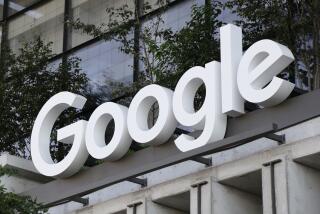U.S. Appoints New Attorney to Handle Microsoft Lawsuit
WASHINGTON — The Justice Department on Friday named Philip S. Beck, a Chicago attorney who represented George W. Bush in November’s disputed presidential election, to be lead trial counsel in the next phase of the Microsoft antitrust case.
Meanwhile, Microsoft filed court papers Friday opposing the government’s effort to expedite the case, saying it wants a federal appeals court to rule first on its request for rehearing.
Beck, 50, a partner at Bartlit Beck Herman Palenchar & Scott, takes over a role previously held by New York attorney David Boies, who successfully argued the government’s case against Microsoft in 1999. Boies, as part of Al Gore’s legal team, later faced off against--and lost to--Beck in the widely watched recount battle in Florida.
“It’s very ironic that Phil would now succeed David in this role,” said Donald Kempf, general counsel at Morgan Stanley, who has worked with Beck for 15 years. “Phil is first and foremost a trial attorney. As he demonstrated in Florida, he’s a razor-sharp cross-examiner. He can try any kind of case there is.”
Beck, who will start work Monday, joins M.J. Moltenbrey and Phillip R. Malone in the department’s antitrust division.
Beck spent 17 years at Kirkland & Ellis before co-founding his current firm in 1994. Specializing in complex litigation, he has represented DuPont, Bayer and Dresser Industries, which was bought by Halliburton Co., a Texas-based oil services firm. Vice President Dick Cheney was chief executive of Halliburton before the election.
The U.S. Court of Appeals in Washington ruled June 28 that Microsoft violated antitrust laws, but it threw out an order to break up the company and asked a lower court to determine the proper punishment.
This week, Microsoft asked the court to reverse one of its rulings related to whether the commingling of software code for the Internet Explorer Web browser and Windows operating system violated federal law.
On Friday, responding to a government request to immediately send the case back to a lower court for review, Microsoft asked the court to delay remanding the case until after it rules on the rehearing.
The company said it will decide whether to appeal to the Supreme Court after the appeals court rules on the rehearing.
Critics say Microsoft is stalling. “It’s a delaying tactic,” said Ed Black, president of the Computer & Communications Industry Assn., which represents several Microsoft foes.
Black and others say Microsoft is concerned that the government will seek to block the release of its new operating system, Windows XP. The product ships to manufacturers at the end of August and will be released to the public in October.
In another troubling sign for Microsoft, a key congressional committee is preparing to hold hearings on the software company’s anti-competitive practices, the first since the appeals court ruling.
The Senate Judiciary Committee, chaired by Sen. Patrick J. Leahy (D-Vt.), expects to meet on the issue as early as September, after the August recess in Congress, a staffer said. On the agenda will probably be Windows XP, which critics say relies on some of the same bundling of technological features the court found to be improper.
More to Read
Sign up for Essential California
The most important California stories and recommendations in your inbox every morning.
You may occasionally receive promotional content from the Los Angeles Times.










